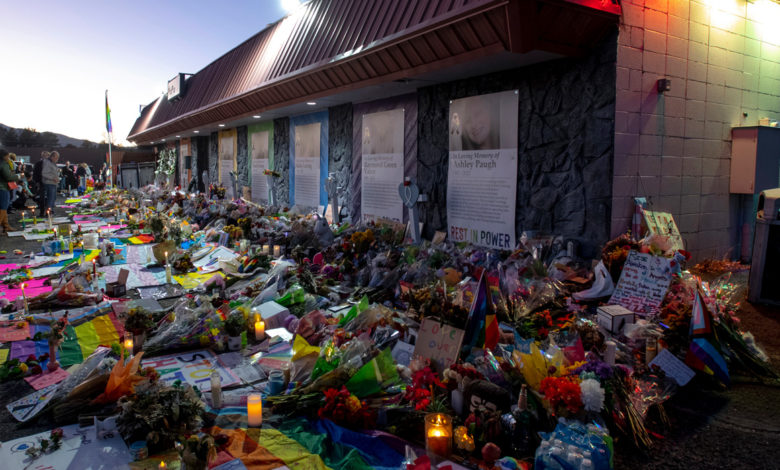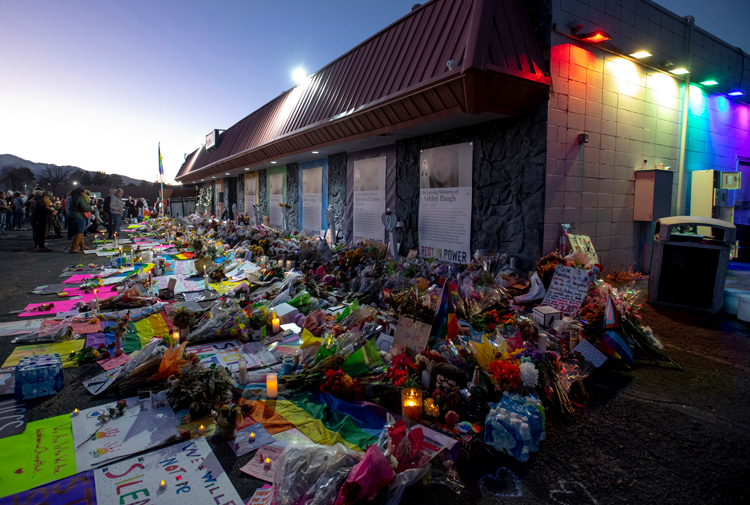

On Saturday night, November 19, I turned to my partner, Alec, and asked if he wanted to go out. There was going to be a big gay dance party at a club in town. We don’t go out a ton these days at our age, but every once in a while we like to see a drag show, or dance with some shirtless men, or just be around other queer people. It’s good to charge your batteries by being among your own people, regardless of how old you are. Our community has a way of reinvigorating itself simply by being in close proximity to one another.
We didn’t end up going out.
The next morning, we got the news about the attack on Club Q in Colorado Springs—the place where Daniel Davis Aston, Derrick Rump, Kelly Loving, Ashley Paugh,and Raymond Green Vance were murdered, and several others injured, by a man with an AR-15.
Immediately, I flashed back to a similar morning on June 12, 2016, when I learned about the Orlando mass shooting at the Pulse nightclub where 49 people were killed and many more injured by a man with an AR-15. Then my mind was flooded with memories of all of the violence and murder that has been committed against queer people.
The murders of 375 trans people worldwide in 2021—the deadliest year for the trans community since the previous year, when 350 trans people were murdered.
The brutal 1998 murder of Matthew Shepard—a watershed moment for me, a closeted gay teen, that caused me to stay in the closet longer than I otherwise would have.
The 2014 murders of Britney Cosby and Crystal Jackson in Port Bolivar, Texas. They were a Black, lesbian couple who were beaten and shot by Cosby’s father. I remembered there being several other instances of murder and violence against lesbians in Texas around that time. Most reporting on it erased the queer identities of the women. But I knew.
The deaths of a generation of queer men during the AIDS epidemic, when politicians boasted that AIDS was “killing the right people”—a thought shared by what felt like everyone else in the world.
All of these sad recollections came to me on that November Sunday morning, but I wasn’t able to cry. I was numb. I turned to Alec and said, “It happened again.”
He said, “I know.”
We and all queer people everywhere understand the violence that we might encounter at any moment, around any corner. Whether we live our lives in spite of that or in fear of that, it traumatizes us all. This trauma manifests in many ways. Maybe we avoid holding hands in public. Maybe we deepen our voices. Maybe we try to present more “stealth.” Maybe we just say Fuck it, I am going to do whatever the fuck I want!
These are reactions to our collective queer trauma that our straight counterparts do not have to endure. It is part of our DNA as queer people to understand that violence is part of the package. Even if we grew up in the most affirming home in the most affirming neighborhood in the most affirming state, we know. We know that the violence will find us, even if it is in the Sunday paper, in a story about something that happened 1,000 miles away.
It goes without saying that this is unacceptable. Everywhere should be safe for all of us, whether we are in Club Q or Pulse, or in our places of worship or at school or in our homes. And yet, these are the places where we typically encounter the worst violent acts.
 The blame is appropriately placed on the world that allows these massacres to happen. This includes politicians like Lauren Boebert, a Colorado congresswoman who is one of the most vocal in telling her followers that queer people are to be feared. The blame also lies with the media outlets that either erase us or mischaracterize us. Even the friendliest accounts of LGBTQ people manage to get it wrong most of the time.
The blame is appropriately placed on the world that allows these massacres to happen. This includes politicians like Lauren Boebert, a Colorado congresswoman who is one of the most vocal in telling her followers that queer people are to be feared. The blame also lies with the media outlets that either erase us or mischaracterize us. Even the friendliest accounts of LGBTQ people manage to get it wrong most of the time.
There are many people and institutions to blame, but I know who the blame does not belong to: Us.
We have every right to live and love and be visible—whether we exist quietly or loudly. In rural towns or in urban cities. Whether we live in America, Iran, Russia, Canada, or the Galapagos Islands, we have a right to be there. We have a right to live. We have a right to be safe. Even if nobody else agrees with us. Living out and proud will always be our best weapon in this culture war—a war we did not start but are forced to fight and even die in.
We can’t escape the trauma or the violence, but we do have each other. And that will get us through. It always has, and it will be what saves us in the end. It has to.
Ryan Leach is a frequent contributor to OutSmart magazine. Follow him on
Medium at medium.com/@ryan_leach.
This article appears in our December 2022 edition of OutSmart.










